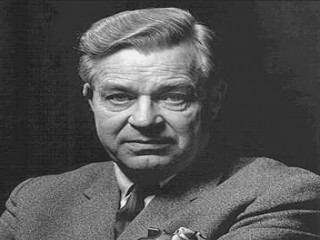
Gunnar Myrdal biography
Date of birth : 1898-12-06
Date of death : 1987-05-17
Birthplace : Gustafs, Sweden
Nationality : Swedish
Category : Science and Technology
Last modified : 2011-08-30
Credited as : Economist, sociologist,
The Swedish economist and sociologist Karl Gunnar Myrdal helped shape social and economic planning in Sweden, focused attention on the problems of the African American, and worked on the problems of the underdeveloped nations.
Gunnar Myrdal was born in Gustafs on Dec. 6, 1898. He graduated from the University of Stockholm Law School in 1923 and received a doctorate of laws in economics in 1927. From 1927 to 1950, he taught economics and, in the 1960s, international economics at the University of Stockholm.
In 1934, Myrdal and his wife, Alva, a sociologist, wrote Crisis in the Population Question, which studied the excessively decreasing Swedish birthrate. Their analysis stressed the need for social planning in order to raise the birthrate without lowering the high standard of living. Their work greatly influenced Scandinavian social planning in the 1930's and opened the way for general social reforms in Sweden. Myrdal served on the new government commissions which were instrumental in bringing about "social engineering," and as a member of the Swedish Senate (1936-1938) and the board of the National Bank of Sweden, he also helped in the rational planning of the economy.
Myrdal directed a study of the African American for the Carnegie Corporation published as An American Dilemma: The Negro and Modern Democracy (1944). Now regarded as a classic of legal, sociological, and anthropological scholarship, it helped focus attention on America's race problem. He believed that the African American plight was a focal point of the general moral dilemma of America: the conflict between the just American goals and ideals and the actual practices of the individual members of society. His work has been cited in U.S. Supreme Court decisions.
Myrdal served as minister of commerce in Sweden (1945-1947). He used his neutrality and objectivity as an international civil servant and as director of the United Nations Economic Commission for Europe (1947-1957). In the 1950s and 1960s, he wrote prolifically on international economics, the problems of underdevelopment, and value biases in Western economic thought.
In 1968, Myrdal completed another major study, Asian Drama: An Inquiry into the Poverty of Nations (3 vols.), which pessimistically analyzes the difficulties of development in southern Asia. Myrdal feels that the disparity between rich and poor nations cannot be bridged until old myths about development are rejected. He argues that the crucial factor is not the amount of foreign aid or the kind of economic system used but the social discipline of the masses. Without more native self-help, without the rousing of the masses and their real participation in nation building, without strong programs of birth control, and without the rooting out of corruption in government, Myrdal concludes that the Asian drama could become a tragedy. His later work includes The Challenge of Affluence (1963). In 1974, he won the Nobel Laureate in Economics, principally for his work on the critical application of economic theory of Third World countries. He passed away in 1987 in Sweden.
















